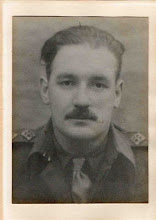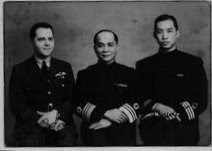
Furtively rather than festively adorned with branches - their only protection from the all-powerful Japanese bombers - two of the five Motor Torpedo Boats which were all that remained of Hong Kong's naval defences spent Christmas Day 1941 lying at the Dairy Farm pier in Telegraph Bay.
The colony was on its knees after 18 days of attack. At 3.15 pm white flags of surrender appeared on the hillside above them. The two tiny boats lay low till dark, then made their way silently to a lagoon off Apleichau Island to join the other three boats in the MTB flotilla. These had just picked up the survivors of an escape party of senior British and Chinese officers, who'd been forced to abandon their launch minutes after setting out from Aberdeen when it was hit by a barrage of Japanese fire. Twelve of the party of 18 survived, though two were injured ...including China's top man in Hong Kong, the one-legged Admiral Chan Chak. He had removed his wooden leg and dived into the sea with the others, but was wounded in the wrist as the shooting continued. His ADC, Henry Hsu, who happened to be a champion swimmer, had helped him make it through the water to Apleichau, where he and the others were eventually picked up by the MTBs.
With the new arrivals now distributed among the five boats, the flotilla sailed past the still-burning southern coast of HK Island to Mirs Bay. The boats were scuttled and the escape party set out to walk through the Japanese-occupied coastal zone to the nearest town in Free China, Waichow -- some 80 miles away. They landed, late on Christmas night, at a village called Nanao. And that's where we'll be spending Christmas night too, as we prepare to re-enact their journey to Waichow.
What with fifty-odd Royal Navy sailors from the MTBs, the twelve survivors from the launch, seven others who set out from Aberdeen in another boat and happened to land on the same beach, not to mention a certain Colin McEwan and his two fellow Secret Service members who had been asked to organise the escape, the original party had by now grown to a sizeable force numbering 68 in total. And they were heavily armed - with bren guns, tommy guns and revolvers.
In 2008, there are just four of us. Alison McEwan, Serene Qiu, Francoise La Toison and Tim Luard. Totally unarmed ... save for a few Christmas presents that may yet come in handy - a Swiss Army knife, a walking-stick and a long, hard and dangerous-looking saucisson.
>
What with fifty-odd Royal Navy sailors from the MTBs, the twelve survivors from the launch, seven others who set out from Aberdeen in another boat and happened to land on the same beach, not to mention a certain Colin McEwan and his two fellow Secret Service members who had been asked to organise the escape, the original party had by now grown to a sizeable force numbering 68 in total. And they were heavily armed - with bren guns, tommy guns and revolvers.
In 2008, there are just four of us. Alison McEwan, Serene Qiu, Francoise La Toison and Tim Luard. Totally unarmed ... save for a few Christmas presents that may yet come in handy - a Swiss Army knife, a walking-stick and a long, hard and dangerous-looking saucisson.
>


2 comments:
Hi Guys - Firstly, good luck! Hope the trip, route, navigating and walking those hills is going well! It's funny as this xmas was the first that my thoughts had really turned to the escapees and what they were really up to on xmas night. I couldn't sleep... and neither could they, but for much bigger reasons! Glad to see you've got in touch with the head man at ping chau - we'll definitely have to go there for lunch when we're there next time. I hope you have good luck on the way to huizhou too. post soon and keep me updated. Russ
Hello, I read your article and parts of your blog. It got my attention because my grandparents & 2 children (my father and aunt) did something similar. They were Norwegian so were not interred by the Japanese at the fall of Hong Kong (Norway was still neutral); but they realised they had to get out so went to neutral Macau. From Macau they smuggled their way into China and made their way on foot to Gweiling. In Gweiling there was a US airforce base, and they managed to get on a plane to India. My grandmother kept diaries and wrote a book about the family's experiences. My father revisited Gweiling a few years ago and told his guide that he remembered sheltering in caves from Japanese bombers when he was 6. The guide got very excited and took him to some schools where he was introduced as someone who had been there. Anyway all very interesting. I wish I could have done what you have done and re-trace the route.
Post a Comment